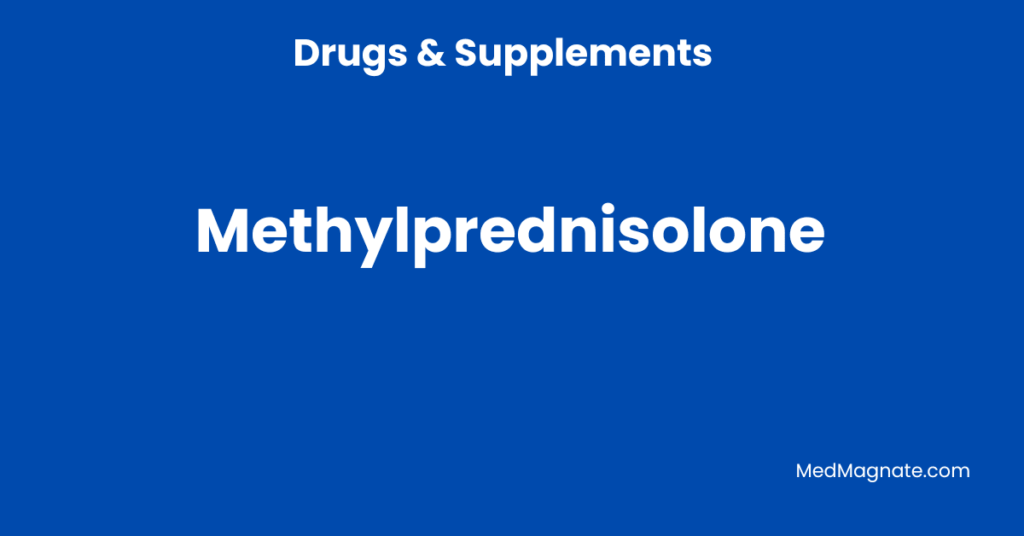Methylprednisolone is a corticosteroid medicine used to reduce inflammation, swelling, and immune system overactivity. It is commonly prescribed for conditions like allergies, asthma, arthritis, skin diseases, and autoimmune disorders.
It is available in several forms, including tablets, injections, and intravenous (IV) preparations, depending on the condition being treated.
What is Methylprednisolone?
Methylprednisolone is a synthetic steroid similar to the natural hormone cortisol produced by the adrenal glands. It works by reducing inflammation and suppressing the immune system, helping the body manage conditions caused by overactive immune responses.
Doctors prescribe methylprednisolone for both short-term flare-ups and long-term management of chronic conditions.
Forms of Methylprednisolone
- Tablets (oral form): For inflammation, allergies, and autoimmune conditions.
- Injection (IM or IV): For severe allergic reactions, asthma attacks, or inflammation.
- Intravenous infusion (hospital use): For serious conditions like multiple sclerosis flare-ups.
Common Uses of Methylprednisolone
Methylprednisolone is used to treat a variety of conditions, including:
- Allergic Reactions: Reduces swelling, redness, and itching.
- Asthma and Respiratory Conditions: Controls severe asthma attacks or COPD flare-ups.
Skin Disorders: Eczema, psoriasis, or severe rashes. - Autoimmune Diseases: Rheumatoid arthritis, lupus, and multiple sclerosis.
- Joint and Muscle Inflammation: For arthritis or tendonitis flare-ups.
- Organ Transplants: Prevents rejection by suppressing the immune system.
How Methylprednisolone Works
Methylprednisolone works by:
- Reducing inflammation: Blocks chemicals in the body that cause swelling and pain.
- Suppressing the immune system: Helps prevent the body from attacking its own tissues in autoimmune diseases.
It acts faster than many other corticosteroids, especially when given in high-dose injections.
Dosage of Methylprednisolone
The dosage varies depending on the condition, severity, and patient’s age. Always follow a doctor’s prescription.
Oral Tablets
- Dose usually ranges from 4 mg to 48 mg per day, depending on the condition.
- Sometimes taken once daily or divided into multiple doses.
- Dose may be gradually reduced (tapered) after treatment to avoid withdrawal symptoms.
Injection or IV
- Used for severe conditions or hospital emergencies.
- Administered by healthcare professionals only.
Important: Never stop methylprednisolone suddenly, especially after long-term use.
Possible Side Effects of Methylprednisolone
Methylprednisolone is effective but can cause side effects, especially with long-term use or high doses.
Common Side Effects
- Increased appetite and weight gain
- Mood changes or irritability
- Insomnia
- Fluid retention and swelling
- Indigestion or stomach upset
Serious Side Effects (rare)
- High blood pressure
- Weakening of bones (osteoporosis)
- Muscle weakness
- Eye problems (glaucoma or cataracts)
- Increased risk of infections
- Stomach ulcers
If you experience severe side effects like sudden swelling, trouble breathing, or severe stomach pain, seek medical help immediately.
Precautions Before Taking Methylprednisolone
- Do not use without a doctor’s prescription.
- Avoid long-term use unless prescribed, due to risk of side effects.
- Inform your doctor if you have diabetes, high blood pressure, heart disease, or infections.
- Pregnant or breastfeeding women should consult a doctor first.
- Avoid sudden discontinuation; always taper under medical supervision.
Methylprednisolone in Children
- Pediatric doses are calculated based on weight.
- Used only under strict medical supervision.
- Long-term use in children can affect growth, so careful monitoring is required.
Conclusion
Methylprednisolone is a powerful corticosteroid that helps reduce inflammation, manage autoimmune diseases, and control allergic reactions.
It is available as tablets, injections, or IV infusions. While highly effective, long-term use may cause side effects, so it should be used exactly as prescribed by a doctor.
FAQs
Q 1. What is methylprednisolone used for?
It is used to treat inflammation, allergies, asthma, autoimmune disorders, and certain skin and joint conditions.
Q 2. Can methylprednisolone be taken daily?
Yes, but only under a doctor’s supervision. Long-term daily use requires careful monitoring.
Q 3. Can I stop methylprednisolone suddenly?
No. Stopping suddenly can cause withdrawal symptoms. The dose must be tapered gradually.
Q 4. Is methylprednisolone safe during pregnancy?
It should only be used if prescribed by a doctor. The benefits must outweigh any potential risks.
Q 5. Can methylprednisolone cause weight gain?
Yes, increased appetite and fluid retention can lead to weight gain, especially with long-term use.
Q 6. How fast does methylprednisolone work?
It can work within hours to days depending on the form (injection works faster than oral tablets).
Q 7. Are there any foods or medicines to avoid while taking methylprednisolone?
Avoid alcohol, NSAIDs, and herbal supplements unless approved by your doctor, as they may increase side effects.

